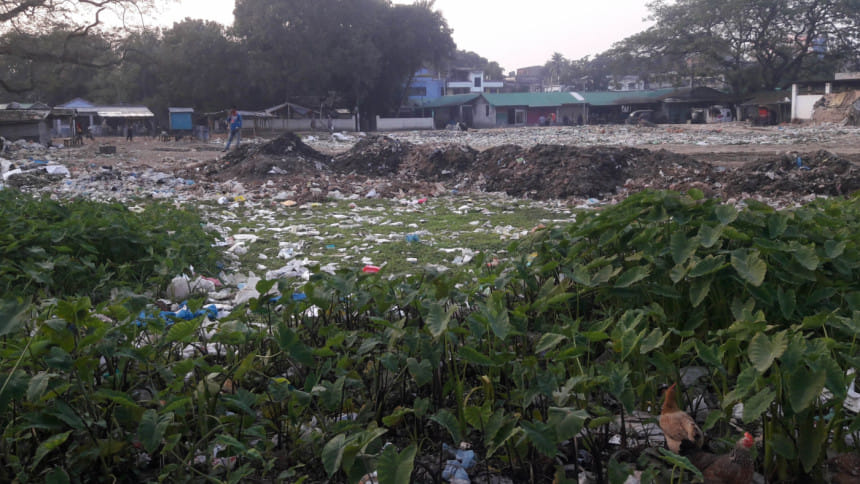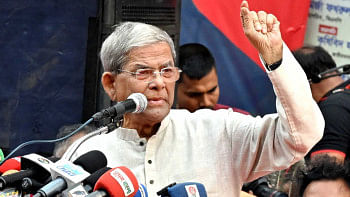Destruction of Jhenidah town ponds in full swing

Unplanned urbanisation, absence of civic conscience among townspeople and lack of garbage management services are contributing to destruction of various waterbodies including ponds in Jhenidah town.
With most of the ponds, filled up with garbage, turning into a source of putrid odour, the fire service of the town is having difficulty finding sufficient water to douse fire.
Senior citizens in the town said there used to be over 150 ponds in the town in the '70s. But there are only 20 of those, both government and privately-owned, in existence now.
Indiscriminate dumping of waste has turned most of the waterbodies into landfills and breeding ground for mosquitoes, they also said.
Haatkhola government pond was once a source of fresh water for the townspeople, said Pikul Malitha, a grocer in the neighbourhood.
This also looks like a garbage dump now. Everyone in the vicinity considers this as a place to dispose of any sort of garbage. Fish sellers at the fish market adjacent to the pond have been dumping fish waste in the pond for eight to ten years, causing an unbearable foul odour to hover in the air.
"The water in the pond used to be crystal clear and the beauty of the pond was a sight to behold. Over the years, when people's need for freshwater for household work started to diminish, a cattle market took shape on its banks. Now a goat market has replaced the cattle market there."
The entire area surrounding the pond sometimes becomes so smelly that customers often avoid his grocery store and go to stores in other areas, he added.
The state of the private ponds in the town is no different. Many owners are filling those up to accommodate housing for their family members or to build markets or rental houses for generating income for their families. The others are just being used to dump waste.
Tofajjal Hossain, owner of a pond in Hamdaha area, said he and his siblings inherited a pond from their father who had passed away.
The siblings are living in different areas and the population in the families are growing. With cost of living on the rise, all their family members have been looking for ways to make best use of common family resources as a source of additional income.
Considering the situation, he said he and his family members are now filling up the pond to build houses on it. Since they cannot afford to buy new land to build houses, the filled-up land will enable each member of the family to own his or her own house.
Besides, no land is available for sale in the town, Tofajjal added.
A Jhenidah fire service station official, Dilip Kumar Sarkar, said the fire service has been facing acute water shortage during fire incidents in the town as most ponds or waterbodies have been filled up.
Lives are endangered and the extent of damage of property increases when they spend crucial time looking for water. Considering this aspect, the town needs to preserve all its ponds, he observed.
Rafikul Islam, associate professor of zoology at Govt KC College, said the remaining ponds in the town are being polluted by dumping of toxic and non-biodegradable waste -- from both houses and factories nearby.
The emission of carbon dioxide and carbon monoxide from the waste is giving rise to levels of these harmful elements in the air, thus endangering public health, he said, adding that in order to protect human health, the ponds and waterbodies in the area have to be saved from pollution and encroachment.
Environment and Diversity Preservation Committee President Masud Ahmed Sanju said ponds and marshlands help protect ecological balance in an area by allowing fish and other aquatic animals to survive and by maintaining balance of temperature, humidity and precipitation in the area.
Without sufficient ponds in an area, temperature rises and aquatic animals including fish become scarce in the area. Moreover, not only water for everyday use in households become scarce, population of birds and other animals in the area falls too.
Therefore, the government including municipality authorities need to make serious efforts to save ponds and other waterbodies, he observed.
Jhenidah Deputy Commissioner Saroj Kumar Nath said absence of civic awareness is causing such destruction to the waterbodies and ponds. The district administration will launch campaigns in future to raise awareness on the negative impact of destroying and polluting waterbodies.
They will also take initiatives to clean up the waterbodies as well as protect those from further pollution, he assured this correspondent.

 For all latest news, follow The Daily Star's Google News channel.
For all latest news, follow The Daily Star's Google News channel. 



Comments